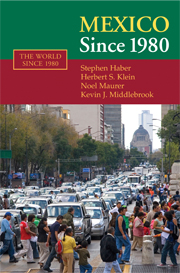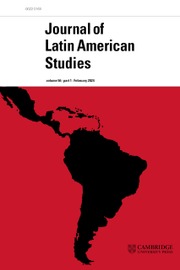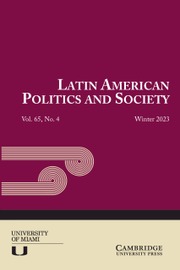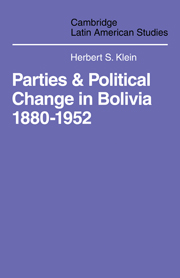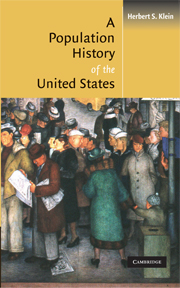Mexico since 1980
This book addresses two questions that are crucial to understanding Mexico’s current economic and political challenges. Why did the opening up of the economy to foreign trade and investment not result in sustained economic growth? Why has electoral democracy not produced rule of law? The answer to those questions lies in the ways in which Mexico’s long history with authoritarian government shaped its judicial, taxation, and property rights institutions. These institutions, the authors argue, cannot be reformed with the stroke of a pen. Moreover, they represent powerful constraints on the ability of the Mexican government to fund welfare-enhancing reforms, on the ability of firms and households to write contracts, and on the ability of citizens to enforce their basic rights.
- Draws on the latest research in social science to provide a fast-paced, non-technical, but novel, study of Mexico in the past quarter century
- Details economic, political, and social change since 1980
- The authors highlight key themes in Mexico's development relating to the transformation of financial underdevelopment, health, education and welfare
Reviews & endorsements
“The four authors have brought together their different disciplinary strengths and their considerable scholarly gifts to produce an interesting new take on what has by now become a familiar story about Mexico's dramatic shift from protectionism to free markets, and from authoritarianism to democracy...The argument is persuasive, well documented, and a mostly readable account of Mexico's transformation...an excellent contribution to our understanding of this period in Mexican history, and, more generally, to the political economy literature.”
-
Kathleen Bruhn, University of California Santa Barbara, Comparative Politics Book Reviews
“This is a volume that is as brilliant as it is controversial. Its brilliance lies in the depth and quality of research, the clearness of argument, and a focused theoretical underpinning. It is an impressive example of the ability of the new institutional economics to explain recent history….It is the best analysis of modern Mexican political economy that I have seen.”
Jeffrey Bortz, Appalachian State University, Journal of Economic History
"Scholars from diverse backgrounds will find Mexico since 1980 useful for its conceptual insights into how authoritarian regimes work; as an accessible account of a major economic, social, and political reform process; and as an outstanding synthesis of a puzzling period of Mexican history."
Hispanic American Historical Review, Graciela Marquez, El Colegio de Mexico
Product details
September 2008Adobe eBook Reader
9780511410628
0 pages
0kg
41 b/w illus.
This ISBN is for an eBook version which is distributed on our behalf by a third party.
Table of Contents
- 1. The second Mexican revolution: economic, political, and social change since 1980
- 2. Mexico before 1982: the political economy of authoritarian rule
- 3. The causes and consequences of free trade
- 4. The Mexican banking system: the politics and economics of financial underdevelopment
- 5. The transformation of Mexican politics
- 6. Health, education, and welfare in Mexico since 1980
- 7. Democracy and development in Mexico: future challenges and the legacy of authoritarian rule.

